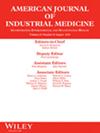Risk of subsequent SARS-CoV-2 infection among vaccinated employees with or without hybrid immunity acquired early in the Omicron-predominant era of the COVID-19 pandemic
Abstract
Background
Hybrid immunity, from COVID-19 vaccination followed by SARS-CoV-2 infection acquired after its Omicron variant began predominating, has provided greater protection than vaccination alone against subsequent infection over 1–3 months of observation. Its longer-term protection is unknown.
Methods
We conducted a retrospective cohort study of COVID-19 case incidence among healthcare personnel (HCP) mandated to be vaccinated and report on COVID-19-associated symptoms, high-risk exposures, or known-positive test results to an employee health hotline. We compared cases with hybrid immunity, defined as incident COVID-19 during the first 6 weeks of Omicron-variant predominance (run-in period), to those with immunity from vaccination alone during the run-in period. Time until COVID-19 infection over 13 subsequent months (observation period) was analyzed by standard survival analysis.
Results
Of 5867 employees, 641 (10.9%, 95% confidence interval [CI]: 10.1%–11.8%) acquired hybrid immunity during the run-in period. Of these, 104 (16.2%, 95% CI: 13.5%–19.3%) experienced new SARS-CoV-2 infection during the 13-month observation period, compared to 2177 (41.7%, 95% CI: 40.3%–43.0%) of the 5226 HCP without hybrid immunity. Time until incident infection was shorter among the latter (hazard ratio: 3.09, 95% CI: 2.54–3.78).
Conclusions
In a cohort of vaccinated employees, Omicron-era acquired SARS-CoV-2 hybrid immunity was associated with significantly lower risk of subsequent infection over more than a year of observation—a time period far longer than previously reported and during which three, progressively more resistant, Omicron subvariants became predominant. These findings can inform institutional policy and planning for future COVID-19 additional vaccine dosing requirements for employees, for surveillance programs, and for risk modification efforts.

 求助内容:
求助内容: 应助结果提醒方式:
应助结果提醒方式:


